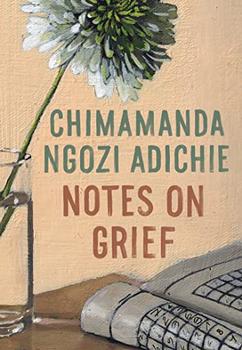Summary | Discuss | Reviews | More Information | More Books

From the globally acclaimed, best-selling novelist and author of We Should All Be Feminists, a timely and deeply personal account of the loss of her father: "With raw eloquence, Notes on Grief … captures the bewildering messiness of loss in a society that requires serenity, when you'd rather just scream. Grief is impolite ... Adichie's words put welcome, authentic voice to this most universal of emotions, which is also one of the most universally avoided" (The Washington Post).
Notes on Grief is an exquisite work of meditation, remembrance, and hope, written in the wake of Chimamanda Ngozi Adichie's beloved father's death in the summer of 2020. As the COVID-19 pandemic raged around the world, and kept Adichie and her family members separated from one another, her father succumbed unexpectedly to complications of kidney failure.
Expanding on her original New Yorker piece, Adichie shares how this loss shook her to her core. She writes about being one of the millions of people grieving this year; about the familial and cultural dimensions of grief and also about the loneliness and anger that are unavoidable in it. With signature precision of language, and glittering, devastating detail on the page—and never without touches of rich, honest humor—Adichie weaves together her own experience of her father's death with threads of his life story, from his remarkable survival during the Biafran war, through a long career as a statistics professor, into the days of the pandemic in which he'd stay connected with his children and grandchildren over video chat from the family home in Abba, Nigeria.
In the compact format of We Should All Be Feminists and Dear Ijeawele, Adichie delivers a gem of a book—a book that fundamentally connects us to one another as it probes one of the most universal human experiences. Notes on Grief is a book for this moment—a work readers will treasure and share now more than ever—and yet will prove durable and timeless, an indispensable addition to Adichie's canon.
"Elegant, moving ... An affecting paean to the author's father, James Nwoye Adichie. The first professor of statistics in his country, James lived an eventful and sometimes fraught life. Funny and principled, he died during the pandemic—not of the virus but kidney disease. Adichie moves through some of the classic stages of grief, including no small amount of anger... Eventually, she reflects on a newfound awareness of mortality and finds a 'new urgency' to live her life and do her work." —Kirkus Reviews (starred review)
"Elegantly spare ... brutally frank . . With raw eloquence, Notes on Grief is both achingly personal and stunningly familiar to anyone who has felt the 'permanent scattering' [of grief]. Written and published less than a year after her father's death, Adichie's pain on these pages is so palpable that one can almost taste its bitterness. She captures the bewildering messiness of loss in a society that requires serenity, when you'd rather just scream. Grief is impolite ... Adichie's words put welcome, authentic voice to this most universal of emotions, which is also one of the most universally avoided." —The Washington Post
"Adichie's exquisitely forthright chronicle of grief generously articulates the harrowing amplification of sorrow, helplessness, and loss during the COVID-19 pandemic ... An intimate and essential illumination of a tragic time." —Booklist
This information about Notes on Grief was first featured
in "The BookBrowse Review" - BookBrowse's membership magazine, and in our weekly "Publishing This Week" newsletter. Publication information is for the USA, and (unless stated otherwise) represents the first print edition. The reviews are necessarily limited to those that were available to us ahead of publication. If you are the publisher or author and feel that they do not properly reflect the range of media opinion now available, send us a message with the mainstream reviews that you would like to see added.
Any "Author Information" displayed below reflects the author's biography at the time this particular book was published.
Chimamanda Ngozi Adichie grew up in Nigeria. Her work has been translated into more than fifty-five languages. She is the author of the novels Purple Hibiscus, which won the Commonwealth Writers' Prize; Half of a Yellow Sun, which was the recipient of the Women's Prize for Fiction "Best of the Best" award; Americanah, which won the National Book Critics Circle Award; the story collection The Thing Around Your Neck and the essays We Should All Be Feminists and Dear Ijeawele, or A Feminist Manifesto in Fifteen Suggestions. Her most recent work is an essay about losing her father, Notes on Grief, and Mama's Sleeping Scarf, a children's book written as Nwa Grace-James. A recipient of a MacArthur Fellowship, she divides her time between the United States and Nigeria.
... Full Biography
Author Interview
Link to Chimamanda Ngozi Adichie's Website
Name Pronunciation
Chimamanda Ngozi Adichie: Chim-muh-MAHN-duh en-GOH-zee ah-DEECH-ee-(ay) The “ay” is soft, not quite a diphthong.
What really knocks me out is a book that, when you're all done reading, you wish the author that wrote it was a ...
Click Here to find out who said this, as well as discovering other famous literary quotes!
Your guide toexceptional books
BookBrowse seeks out and recommends the best in contemporary fiction and nonfiction—books that not only engage and entertain but also deepen our understanding of ourselves and the world around us.